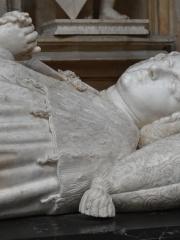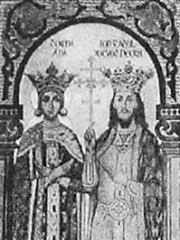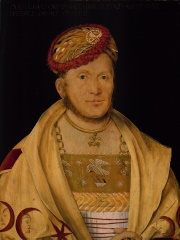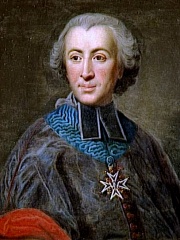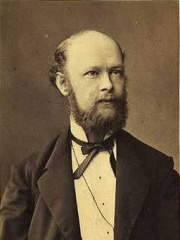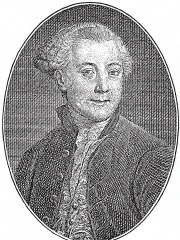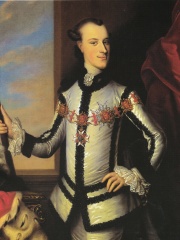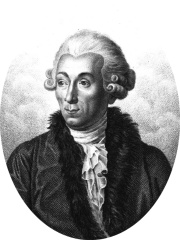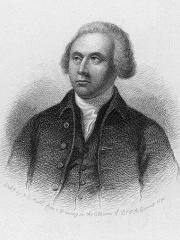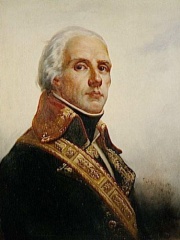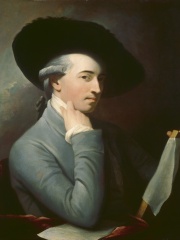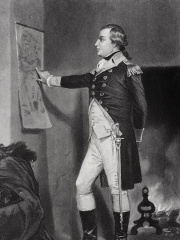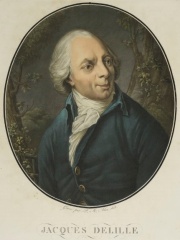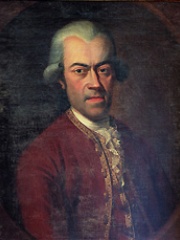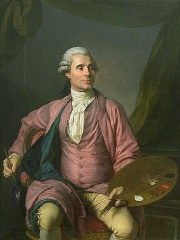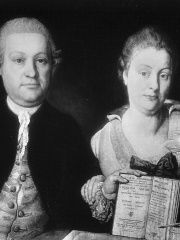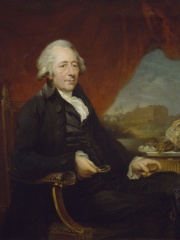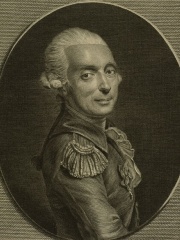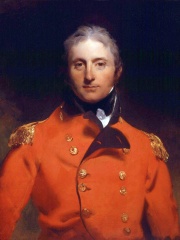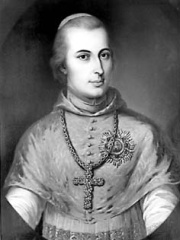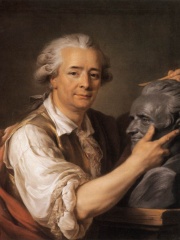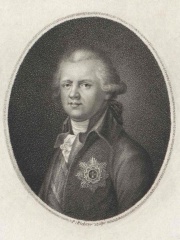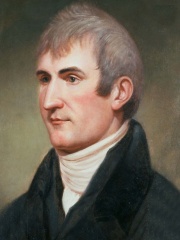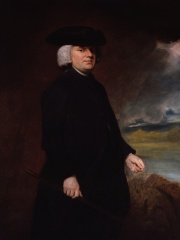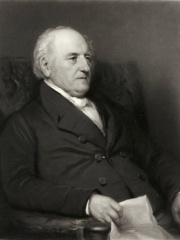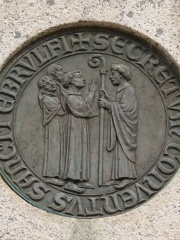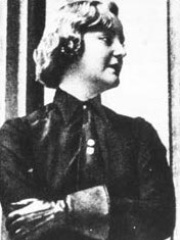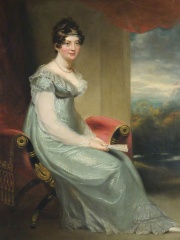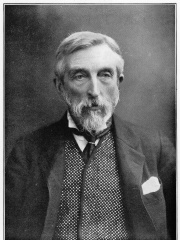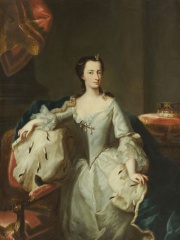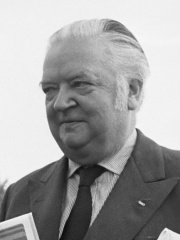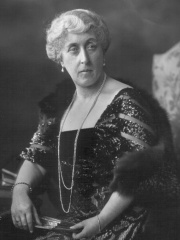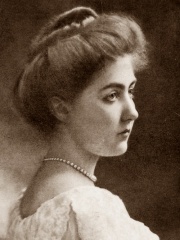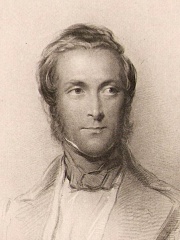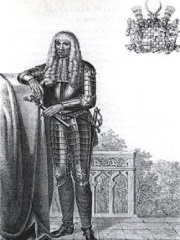POLITICIAN
William Cavendish-Bentinck, 3rd Duke of Portland
1738 - 1809

 William Cavendish-Bentinck, 3rd Duke of Portland
William Cavendish-Bentinck, 3rd Duke of Portland
William Henry Cavendish Cavendish-Bentinck, 3rd Duke of Portland (14 April 1738 – 30 October 1809) was a British Whig and then a Tory politician during the late Georgian era. He served as chancellor of the University of Oxford (1792–1809) and as Prime Minister of Great Britain (1783) and then of the United Kingdom (1807–1809). The gap of 26 years between his two terms as prime minister is the longest of any British prime minister. He is also an ancestor of Queen Elizabeth II, and therefore King Charles III through his great-granddaughter Cecilia Bowes-Lyon, Countess of Strathmore and Kinghorne. Read more on Wikipedia
His biography is available in 43 different languages on Wikipedia (up from 42 in 2024). William Cavendish-Bentinck, 3rd Duke of Portland is the 8,989th most popular politician (down from 8,097th in 2024), the 1,979th most popular biography from United Kingdom (down from 1,607th in 2019) and the 321st most popular British Politician.
Memorability Metrics
Page views of William Cavendish-Bentinck, 3rd Duke of Portland by language
Among POLITICIANS
Among politicians, William Cavendish-Bentinck, 3rd Duke of Portland ranks 8,989 out of 19,576. Before him are Damat Ibrahim Pasha, Margaret of Bourbon, Brad Little, Radu I of Wallachia, Artemio Franchi, and Casimir, Margrave of Brandenburg-Kulmbach. After him are Étienne Charles de Loménie de Brienne, Srinagarindra, Princess Olga Paley, Sisowath Sirik Matak, Karl Verner, and Presian I of Bulgaria.
Most Popular Politicians in Wikipedia
Go to all RankingsDamat Ibrahim Pasha
1550 - 1601
HPI: 62.28
Rank: 8,988
Margaret of Bourbon
1438 - 1483
HPI: 62.28
Rank: 8,989
Brad Little
1954 - Present
HPI: 62.28
Rank: 8,990
Radu I of Wallachia
1330 - 1383
HPI: 62.27
Rank: 8,991
Artemio Franchi
1922 - 1983
HPI: 62.27
Rank: 8,992
Casimir, Margrave of Brandenburg-Kulmbach
1481 - 1527
HPI: 62.27
Rank: 8,993
William Cavendish-Bentinck, 3rd Duke of Portland
1738 - 1809
HPI: 62.27
Rank: 8,994
Étienne Charles de Loménie de Brienne
1727 - 1794
HPI: 62.27
Rank: 8,995
Srinagarindra
1900 - 1995
HPI: 62.27
Rank: 8,996
Princess Olga Paley
1865 - 1929
HPI: 62.27
Rank: 8,997
Sisowath Sirik Matak
1914 - 1975
HPI: 62.27
Rank: 8,998
Karl Verner
1846 - 1896
HPI: 62.27
Rank: 8,999
Presian I of Bulgaria
820 - 852
HPI: 62.27
Rank: 9,000
Contemporaries
Among people born in 1738, William Cavendish-Bentinck, 3rd Duke of Portland ranks 15. Before him are Thomas Abbt, Ethan Allen, Arthur Phillip, Adolphus Frederick IV, Duke of Mecklenburg-Strelitz, Johann Hermann, and Aleijadinho. After him are Thomas Nelson Jr., Jacques François Dugommier, Benjamin West, Richard Montgomery, John Singleton Copley, and Jacques Delille. Among people deceased in 1809, William Cavendish-Bentinck, 3rd Duke of Portland ranks 17. Before him are August Ludwig von Schlözer, Joseph-Marie Vien, Leopold Auenbrugger, Matthew Boulton, François Laurent d'Arlandes, and John Moore. After him are Archduke Karl of Austria-Este, Augustin Pajou, Ludwig von Cobenzl, Anton Stamitz, Dirk van der Aa, and Meriwether Lewis.
Others Born in 1738
Go to all RankingsThomas Abbt
MATHEMATICIAN
1738 - 1766
HPI: 67.01
Rank: 9
Ethan Allen
BUSINESSPERSON
1738 - 1789
HPI: 66.09
Rank: 10
Arthur Phillip
POLITICIAN
1738 - 1814
HPI: 65.48
Rank: 11
Adolphus Frederick IV, Duke of Mecklenburg-Strelitz
POLITICIAN
1738 - 1794
HPI: 65.12
Rank: 12
Johann Hermann
BIOLOGIST
1738 - 1800
HPI: 64.23
Rank: 13
Aleijadinho
SCULPTOR
1738 - 1814
HPI: 62.31
Rank: 14
William Cavendish-Bentinck, 3rd Duke of Portland
POLITICIAN
1738 - 1809
HPI: 62.27
Rank: 15
Thomas Nelson Jr.
MILITARY PERSONNEL
1738 - 1789
HPI: 61.66
Rank: 16
Jacques François Dugommier
MILITARY PERSONNEL
1738 - 1794
HPI: 61.46
Rank: 17
Benjamin West
PAINTER
1738 - 1820
HPI: 61.01
Rank: 18
Richard Montgomery
MILITARY PERSONNEL
1738 - 1775
HPI: 60.77
Rank: 19
John Singleton Copley
PAINTER
1738 - 1815
HPI: 59.79
Rank: 20
Jacques Delille
WRITER
1738 - 1813
HPI: 59.60
Rank: 21
Others Deceased in 1809
Go to all RankingsAugust Ludwig von Schlözer
HISTORIAN
1735 - 1809
HPI: 64.79
Rank: 11
Joseph-Marie Vien
PAINTER
1716 - 1809
HPI: 63.56
Rank: 12
Leopold Auenbrugger
PHYSICIAN
1722 - 1809
HPI: 63.45
Rank: 13
Matthew Boulton
INVENTOR
1728 - 1809
HPI: 63.06
Rank: 14
François Laurent d'Arlandes
ENGINEER
1742 - 1809
HPI: 62.92
Rank: 15
John Moore
MILITARY PERSONNEL
1761 - 1809
HPI: 62.88
Rank: 16
William Cavendish-Bentinck, 3rd Duke of Portland
POLITICIAN
1738 - 1809
HPI: 62.27
Rank: 17
Archduke Karl of Austria-Este
NOBLEMAN
1785 - 1809
HPI: 62.23
Rank: 18
Augustin Pajou
SCULPTOR
1730 - 1809
HPI: 62.03
Rank: 19
Ludwig von Cobenzl
POLITICIAN
1753 - 1809
HPI: 60.89
Rank: 20
Anton Stamitz
COMPOSER
1750 - 1809
HPI: 59.75
Rank: 21
Dirk van der Aa
PAINTER
1731 - 1809
HPI: 58.72
Rank: 22
Meriwether Lewis
EXPLORER
1774 - 1809
HPI: 58.42
Rank: 23
In United Kingdom
Among people born in United Kingdom, William Cavendish-Bentinck, 3rd Duke of Portland ranks 1,979 out of 8,785. Before him are William Paley (1743), Tom Conti (1941), John Rimmer (1878), Kate Moss (1974), Sam Smith (1992), and Peter Barlow (1776). After him are Evelyn Beatrice Hall (1868), Orderic Vitalis (1075), Unity Mitford (1914), David Yates (1963), John Mills (1908), and Princess Mary, Duchess of Gloucester and Edinburgh (1776).
Others born in United Kingdom
Go to all RankingsWilliam Paley
PHILOSOPHER
1743 - 1805
HPI: 62.31
Rank: 1,973
Tom Conti
ACTOR
1941 - Present
HPI: 62.31
Rank: 1,974
John Rimmer
ATHLETE
1878 - 1962
HPI: 62.30
Rank: 1,975
Kate Moss
MODEL
1974 - Present
HPI: 62.29
Rank: 1,976
Sam Smith
SINGER
1992 - Present
HPI: 62.28
Rank: 1,977
Peter Barlow
MATHEMATICIAN
1776 - 1862
HPI: 62.28
Rank: 1,978
William Cavendish-Bentinck, 3rd Duke of Portland
POLITICIAN
1738 - 1809
HPI: 62.27
Rank: 1,979
Evelyn Beatrice Hall
WRITER
1868 - 1956
HPI: 62.27
Rank: 1,980
Orderic Vitalis
WRITER
1075 - 1142
HPI: 62.26
Rank: 1,981
Unity Mitford
SOCIAL ACTIVIST
1914 - 1948
HPI: 62.26
Rank: 1,982
David Yates
FILM DIRECTOR
1963 - Present
HPI: 62.25
Rank: 1,983
John Mills
ACTOR
1908 - 2005
HPI: 62.24
Rank: 1,984
Princess Mary, Duchess of Gloucester and Edinburgh
POLITICIAN
1776 - 1857
HPI: 62.24
Rank: 1,985
Among POLITICIANS In United Kingdom
Among politicians born in United Kingdom, William Cavendish-Bentinck, 3rd Duke of Portland ranks 321. Before him are Edward the Exile (1016), Charles Booth (1840), Princess Mary of Great Britain (1723), Ine of Wessex (700), Michael Morris, 3rd Baron Killanin (1914), and Princess Helena Victoria of Schleswig-Holstein (1870). After him are Princess Mary, Duchess of Gloucester and Edinburgh (1776), Gerry Adams (1948), Princess Patricia of Connaught (1886), Herbert Pitman (1877), James Broun-Ramsay, 1st Marquess of Dalhousie (1812), and Edward Fortunatus (1565).
Edward the Exile
1016 - 1057
HPI: 62.55
Rank: 315
Charles Booth
1840 - 1916
HPI: 62.52
Rank: 316
Princess Mary of Great Britain
1723 - 1772
HPI: 62.44
Rank: 317
Ine of Wessex
700 - 728
HPI: 62.42
Rank: 318
Michael Morris, 3rd Baron Killanin
1914 - 1999
HPI: 62.35
Rank: 319
Princess Helena Victoria of Schleswig-Holstein
1870 - 1948
HPI: 62.32
Rank: 320
William Cavendish-Bentinck, 3rd Duke of Portland
1738 - 1809
HPI: 62.27
Rank: 321
Princess Mary, Duchess of Gloucester and Edinburgh
1776 - 1857
HPI: 62.24
Rank: 322
Gerry Adams
1948 - Present
HPI: 62.15
Rank: 323
Princess Patricia of Connaught
1886 - 1974
HPI: 62.12
Rank: 324
Herbert Pitman
1877 - 1961
HPI: 62.11
Rank: 325
James Broun-Ramsay, 1st Marquess of Dalhousie
1812 - 1860
HPI: 62.10
Rank: 326
Edward Fortunatus
1565 - 1600
HPI: 62.06
Rank: 327

